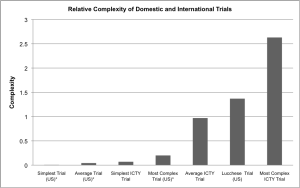[William S. Dodge is The Honorable Roger J. Traynor Professor of Law and Associate Dean for Research at the University of California, Hastings College of the Law. From August 2011 to July 2012, he served as Counselor on International Law to the Legal Adviser at the U.S. Department of State, where he worked on the amicus briefs of the United States in Kiobel v. Royal Dutch Petroleum Co
. The views expressed here are his own and do not necessarily reflect the views of the State Department or of the United States.]
The Supreme Court held in
Kiobel v. Royal Dutch Petroleum Co., 133 S. Ct. 1659 (2013), that the presumption against extraterritoriality applies to suits brought under the Alien Tort Statute (ATS). In a
recent post, Roger Alford asks whether a federal court sitting in diversity or a state court of general jurisdiction may still hear the federal common law claims for torts in violation of the law of nations that the Court recognized in
Sosa v. Alvarez-Machain, 542 U.S. 692 (2004). The answer depends on whether
Kiobel applied the presumption against extraterritoriality to the ATS itself or to
Sosa’s federal common law cause of action.
As a general matter, the presumption against extraterritoriality does not apply to jurisdictional statutes. Putting
Kiobel to one side for the moment, I know of only two cases in which the Supreme Court has used the presumption to interpret statutes that might be characterized as jurisdictional. In
Argentine Republic v. Amerada Hess Shipping Corp., 488 U.S. 428, 440-41 (1989), the Court applied the presumption to the Foreign Sovereign Immunities Act, and in
Smith v. United States, 507 U.S. 197, 203-04 (1993), it applied the presumption to the Federal Tort Claims Act. But both the FSIA and the FTCA codify rules of immunity, which the Court has characterized as substantive, and so neither statute is purely jurisdictional. No one suggests that the presumption against extraterritoriality limits 28 U.S.C. § 1331 (the federal question statute), or 28 U.S.C. § 1332 (the diversity and alienage jurisdiction statute), or 18 U.S.C. § 3231 (the subject matter jurisdiction statute for federal criminal offenses). Yet none of these jurisdictional provisions contain the clear indication of extraterritoriality that would be necessary to rebut the presumption. To take one example, if the presumption against extraterritoriality were applied to 18 U.S.C. § 3231, a federal court would have to dismiss for lack of subject matter jurisdiction a federal prosecution for bombing U.S. government facilities abroad despite the fact that the substantive criminal statute (18 U.S.C. § 2332f) expressly applies when “the offense takes place outside the United States.” That makes no sense, and is not a result that any sensible court would reach.
The Supreme Court’s decision in
Morrison v. National Australia Bank, 130 S. Ct. 2869 (2010), confirms the distinction between substantive statutes to which the presumption against extraterritoriality applies and jurisdictional statutes to which it does not. In
Morrison, the Court used the presumption to limit a substantive provision of the Securities Exchange Act, finding “no affirmative indication in the Exchange Act that § 10(b) applies extraterritorially.” Id. at 2883. But notably, the Court did not apply the presumption against extraterritoriality to the Exchange Act’s jurisdictional provision. To the contrary, the Court specifically held in Part II of its opinion that “[t]he District Court here had jurisdiction under 15 U.S.C. § 78aa to adjudicate the question whether § 10(b) applies to National’s conduct,” id. at 2877, despite the fact that § 78aa contains no clear indication of extraterritoriality, which would be needed to rebut the presumption if it applied.
Kiobel is consistent with the distinction that courts applying the presumption against extraterritoriality have long drawn between jurisdictional and substantive statutes. “We typically apply the presumption to discern whether an Act of Congress
regulating conduct applies abroad,” the Court noted. 133 S. Ct. at 1664 (emphasis added). The ATS was not such a statute; the
Sosa Court had held that it was “strictly jurisdictional.” But
Sosa also held that the ATS authorized courts to recognize federal common law causes of action for torts in violation of the law of nations, and it was to those causes of action that the Supreme Court applied the presumption in
Kiobel. “[W]e think the principles underlying the canon of interpretation similarly constrain courts considering
causes of action that may be brought under the ATS.” Id. (emphasis added). Thus, after reviewing the text and history of the ATS, the Court concluded “that the presumption against extraterritoriality applies to
claims under the ATS, and that nothing in the statute rebuts that presumption.” Id. at 1669 (emphasis added).
To be clear,

